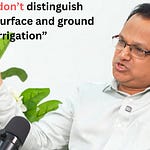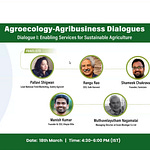With every David and Goliath Agritech player now co-opting ‘Regenerative Agriculture’, I made this meme a few weeks back to point out an obvious fact sitting uncomfortably on my agritech analyst hat: ‘Regenerative Agriculture’ has officially entered the trough of disillusionment.
Mind you, in a country like India, ‘regenerative agriculture’ is as much illegible as ‘organic agriculture’ or ‘natural farming’. Rightfully so, because each agroclimatic zone adapts ‘agroecology’ based on their specific ecological niche.
In a country with more than 1.8 million organic producers spanning over 2.66 million hectares (State of Organic Agriculture 2023), the challenge that India faces in the context of scaling ‘organic agriculture’ is extremely complex.
In August’22, when I wrote ‘Organic Foods and the Tricky Question of Luxury Beliefs’, I wrote,
“Organic food is now a "luxury belief" among the privileged rich who are now obsessed with talking so much about synthetic chemicals inside food, without realizing how badly the economics is stacked against the farmer to grow food and gain a penny more, leave aside safe food (and genuine concerns one may have about safe food)”
What makes organic food ‘wickedly tricky’ boils down to trust vs certification.
“On the one end, Trust doesn’t scale. You can only investigate a smaller group of farmers and investigate if they are serious about regenerative farming practices.
On the other end, Certification is never foolproof to track the food production process. Even if you install sensors, farmers know their way through and can make sure that only approved data passes through.”
Should we dismiss “Organic farming” because of its operational measurement challenges? How do we address the tricky question of luxury beliefs in organic foods? How do we scale agroecology in smallholding contexts?
To navigate these challenging questions, I spoke with Ramanjaneyulu GV, one of the foremost advocates for pesticide-free farming in India.
In this unedited podcast conversation with unfiltered, strong opinions that were weakly held, we discussed,
Why is there a fundamental disconnect in Indian agriculture between reading the signals of production and the market?
Why is Indian Agriculture so stuck in past, whether it is eulogizing over the green revolution of the sixties or a romanticised ideal of an ancient agrarian past?
Why is Indian agriculture so fixated on rice and wheat to the extent that we approach other commodities (say oil seeds, pulses or millet) from the lens of rice and wheat?
What are the challenges in scaling the production of millets? What mistakes are we making in improving the productivity of millets?
What are the challenges in growing oil palm in India?
Why have we completely neglected user[farmer]-driven innovation ecosystem in Indian agriculture?
Should we grow foods in polyhouses in tropical countries like India? Do we need hybrids for cotton and paddy in India?
Can political boundaries be reconciled with ecological boundaries? How can we transform production and cropping systems while respecting ecological limits?
What have been the second-order effects of lift irrigation schemes in the southern state of Telangana? How Telangana could have become a leader in the production of oilseeds, pulses and millets?
What agricultural solutions can work for small and marginal farmers for their future in agriculture?
What are the three major strengths of India when it comes to agriculture?
What are the second-order effects of growing rice and wheat and distributing them via public distribution systems?
Why is Indian agriculture stuck between the market and the government, sending distorted signals to farmers?
How do we deal with the operational challenge of bringing trust and credibility to organic/natural/regenerative farming across production and market dimensions? How do we build sustainable production systems for farmers practising agroecology and help them move away from fertilisers?
Why the notion of ‘safe pesticide’ is problematic? How feasible is ‘organic farming’ for a typical profile of an Indian farmer?
How our collective understanding of soils is outdated? How can farmers transition to ‘agroecology’ while carefully managing ‘yield loss’? What are the steps involved? Why are local microbial preparations essential when compared to buying biofertilisers prepared in a lab?
How to move beyond the trust vs certification conundrum to bring credibility to organic farming? What are the three levels of trust in the context of ‘organic farming’? What is the state of regulation?
Why did India adopt the PGS and NPOP group approach to manage the costs of certification? How do we manage data-based evidence to verify claims of trust?
Why did Participatory Guarantee Systems (PGS) fail to scale among organic food retailers in India?
How did certifications come under WTO’s non-tariff barriers and why did it break down? How have private companies’ labels for regenerative foods further increased the complexity, passing on the costs to the consumers?
How did Indian farmers lose the opportunity to transition from PGS to NPOP within one year in India, thanks to APEDA and NCOF? How can we design a progressive layering of certification systems for organic foods?
How can modern food retailers in cities adopt interoperable organic food certifications to bring trust and credibility from aggregators to farmers? (Case Study: Organic laddoos for Tirupati Balaji temple)
Is a third-party certification body more trustworthy due to a conflict of interest?
How does a consumer bias of ‘high price = quality’ affect the organic food supply chain?
What are the challenges in making ‘organic food’ affordable, keeping costs of managing trust low?
Why is it unfair to compare the price of organic food with regular market prices in a country like India?
How do we manage the high water productivity of rice cultivation in India while managing labour costs?
How can we create a guild of retailers to minimize the costs of aggregation instead of attempting to control the supply chain?
Why farmers’ markets cannot be trusted in certain cases? Why ‘single origin millets or pulses’ is a misnomer?
Why do we need to invest in financial systems that help farmers manage the agroecological transition and help retailers hold the product around the year?
Why did CSA come up with a partnership with Rangde to create an investment fund?
How can we create financial instruments for cluster-based investments in infrastructure along with FPO to buy back the infrastructure at a later stage?
How do we create investments and streamline the supply chain to solve depressed prices for tomatoes and onions?
How adopting the ecosystem approach is better than being an exploitative agritech entrepreneur who wants to control the supply chain?
What were some of the failure stories in managing ecosystems? How do we create mechanisms to create trust among various players for quality assurance?
How can we connect native villages along with farmers with consumers?
How can DPGs help in creating platforms for trust coordination between farmers, retailers and consumers?
Why FPOs need to focus on systems instead of training?
Why is CSA setting up an academy for agroecology with a community of practitioners to create new forms of knowledge and foster partnerships?
I hope you enjoy this conversation (which left me charged with optimism) as much as I did.
So, what do you think?
How happy are you with today’s edition? I would love to get your candid feedback. Your feedback will be anonymous. Two questions. 1 Minute. Thanks.🙏
💗 If you like “Agribusiness Matters”, please click on Like at the bottom and share it with your friend.















